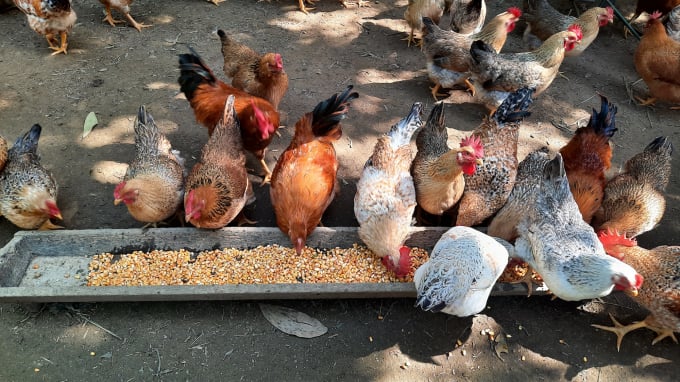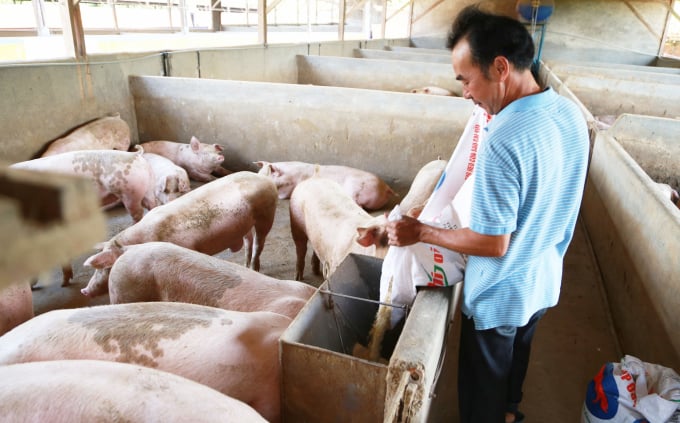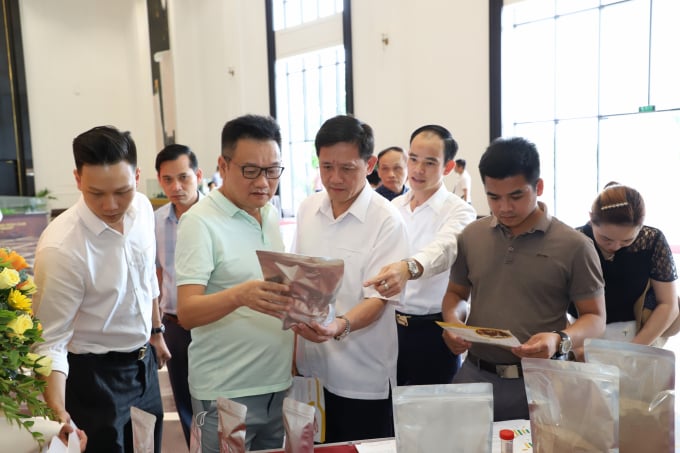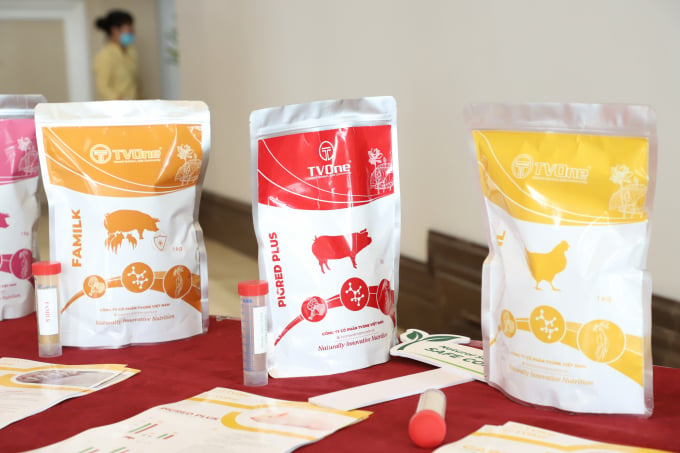June 17, 2025 | 16:15 GMT +7
June 17, 2025 | 16:15 GMT +7
Hotline: 0913.378.918
June 17, 2025 | 16:15 GMT +7
Hotline: 0913.378.918
Although late to the market, Vietnam's animal feed industry has developed with a relatively fast growth rate.
According to the Department of Livestock Production, there were 233 animal feed production establishments nationwide in 2011, with a total design capacity of 16.1 million tons. This figure rose to 264 establishments by 2019, with a total design capacity of 40.5 million tons.
The number of feed production establishments increased by 13.1% (equivalent to 1.48%/year) in the period of 2011 to 2019 but the design capacity increased by 151.6% (equivalent to 16.8%/year); factories belonging to foreign businesses accounts for 32% of the total.

The cost of animal feed currently accounts for about 65-70% of production costs, but Vietnam is at a disadvantage due to its dependency on imported raw materials. Photo: Nguyen Thanh.
The production of animal feed in the country is constantly increasing. In 2011, the production of animal feed reached 11.5 million tons, and by 2019 it has increased to 19 million tons. With this growth, Vietnam has become the 10th largest country in the world and 1st in the ASEAN region in terms of industrial animal feed production.
Additionally, the animal feed processing technology in Vietnam is also advancing. Most of the feed production lines are new generation and originate from countries with advanced technology such as Europe and the United States.
Nearly 80% of the current animal feed production facilities have automatic or semi-automatic production lines; Food quality and safety are also being improved.
According to forecasts, Vietnam's animal feed industry is assessed as having boundless potential, which will continue to attract investment capital sources to expand in size, output as well as the number of businesses.
However, the sharp increase in the price of animal feed ingredients in the world market recently has had a great impact on the price of animal feed in Vietnam. The main cause of which is the Covid-19 pandemic, which has disrupted the supply chain of feed ingredients such as corn, soybeans, and wheat. The current cost of animal feed accounts for about 65-70% of the production cost. The rise in the price of animal feed has resulted in a sharp decrease in profits for farmers. Meanwhile, most of our country's feed ingredients still depend on imports, especially feed additives.

Vietnamese livestock is still less competitive due to its dependence on imported feed materials. Photo: VC.
It is imperative to gradually reduce dependence on imported raw materials, especially feed additives to reduce costs and improve competitiveness for the livestock industry in Vietnam.
It is necessary to have mechanisms and policies to encourage and support the utilization of by-products in cultivation, husbandry and aquaculture to produce and process animal feed.
Additionally, it is necessary to encourage businesses and breeders to apply science and technology, in production and management to reduce the cost of animal feed production; improve and raise the quality of breeding stock in order to increase productivity and quality of output products. On the other hand, it is also recommended to promote research and attract investment in the animal feed additives production industry in our country.
Vietnam imports 700,000 tons of feed additives and supplements in 2021, which is equivalent to 1 billion USD. Despite being an agricultural country, Vietnam is not actively producing feed additives, but depends on countries such as China, India, Europe, and the United States while domestic raw materials are abundant and diverse.
With such limitation, some domestic businesses are promoting research and investment cooperation to produce feed additives domestically and gradually reduce dependency on imports. TVOne Vietnam Joint Stock Company is one of such pioneering businesses.
TVOne Company recently held a seminar on "Breakthrough solution for additive production from plant extracts in Vietnam". The seminar is organized with the purpose of introducing and sharing breakthroughs in the production of additives from plant extracts including the application of ginseng, essential oils and plant extracts in the production of animal feed supplements.

Representatives from TVOne Joint Stock Company introducing animal feed additives to leaders of the Department of Livestock Production. Photo: Nguyen Thanh.
The seminar was attended by leaders of the Department of Livestock Production and representatives from the Vietnam Academy of Science and Technology.
This is a bold and new direction in which TVOne Vietnam cooperates with domestic and foreign research institutes and scientists to apply European technology transfer. TVOne aims towards an agricultural sector without antibiotics and chemicals; develop organic agriculture, self-sufficient in technology to provide the best solutions for the livestock and aquaculture industry in Vietnam and the region.
TVOne reported that it will invest in establishing a material area and a factory to extract animal feed additives from plants with 98% domestic herbal ingredients including panax ginseng, female ginseng, artichokes, stinging nettles, etc.
Mr. Nguyen Duc Phuong, General Director of TVOne Vietnam Joint Stock Company, said that the company has planned the material area and will closely monitor it following VietGAP standards. This activity partly resolves the problems of fallow land in many areas, increasing farmers' income and improving their quality of life.
"With modern machinery and equipment imported from Europe, the company will use single-active plant extraction technology to produce additives and replace antibiotics, thereby increasing productivity in livestock, serving feed factories and livestock farms in the country and abroad", said Mr. Phuong.

Animal feed additives extracted from plants with 98% herbal ingredients are distributed by TVOne Joint Stock Company. Photo: Vu Cuong.
According to Mr. Duong Tat Thang, Director of the Department of Livestock Production, Vietnam's livestock industry has achieved great achievements in recent years, but it also faces many difficulties including climate change, pandemics, environmental pollution, food hygiene and safety, international competition pressure, increased prices of input materials for animal feed...
“In Vietnam, industrial feed accounts for 70% of the demand for animal feed, 30% of farmers utilize available or mixed feed. There are currently 225 supplement production facilities nationwide. This type of feed accounts for a small proportion in industrial feed but plays an important role. Supplementary feed for livestock is in great demand, but supply is lacking", said Mr. Thang.
According to Mr. Duong Tat Thang, the price of feed as well as raw materials for animal feed will increase in 2022, so it is important to research new products and new formulas to increase value and improve competitiveness for Vietnamese livestock products. This the current and future orientation for Vietnamese livestock, to ensure food safety, reduce antibiotics in livestock, develop sustainable livestock and head towards international economic integration.
With advantages in developing domestic medicinal herbs, the research, extraction, and production of herbal products as livestock feed additives and supplements limits the use of antibiotics as well as improves the quality of products. This is the advantegeous development direction for Vietnam: create livelihoods for farmers, help the livestock industry improve product value, increase competitiveness, and develop sustainably.
In 2021, the country used nearly 33 million tons of refined feed with the domestic market providing only 13 million tons (nearly 4%) of raw material needs for animal feed processing; the remaining were imported. In the group of raw materials, refined feed (maize, pasta, bran, broken, cassava) accounted for 65% (24 million tons), protein feed (vegetable and animal protein) accounted for 27% (8.5 million tons).
Translated by Nguyen Hai Long
/2025/06/12/3721-2-202745_83.jpg)
(VAN) TH made an impression at Seoul Food 2025 with its line of natural beverages, paving the way for Vietnamese food products to enter the South Korean market.

(VAN) Soc Trang's success in rice exports stems from a strategy of developing fragrant and specialty rice cultivation areas and standardizing production toward low-emission practices.
/2025/06/11/1311-5-120811_839.jpg)
(VAN) The pig farming industry is facing the challenge of comprehensive restructuring to meet requirements for quality, safety, traceability, and market expansion both domestically and for export.

(VAN) Vietnam considers participating in ALGROALBA in order to expand agricultural production, coordinate the assessment and effective exploitation potential land.
/2025/06/05/5314-1-184727_407.jpg)
(VAN) From seemingly worthless fish scales and skin, enzymes and lactic ferments can transform by-products into peptides, opening a sustainable, effective business direction and elevating Vietnamese seafood.

(VAN) TTC AgriS and IFC signed a strategic partnership to develop a sustainable agricultural value chain, aiming to achieve the Net Zero target by 2035.

(VAN) Seafood by-products are opening a new path, combining green growth and technological innovation to enhance the industry's value.